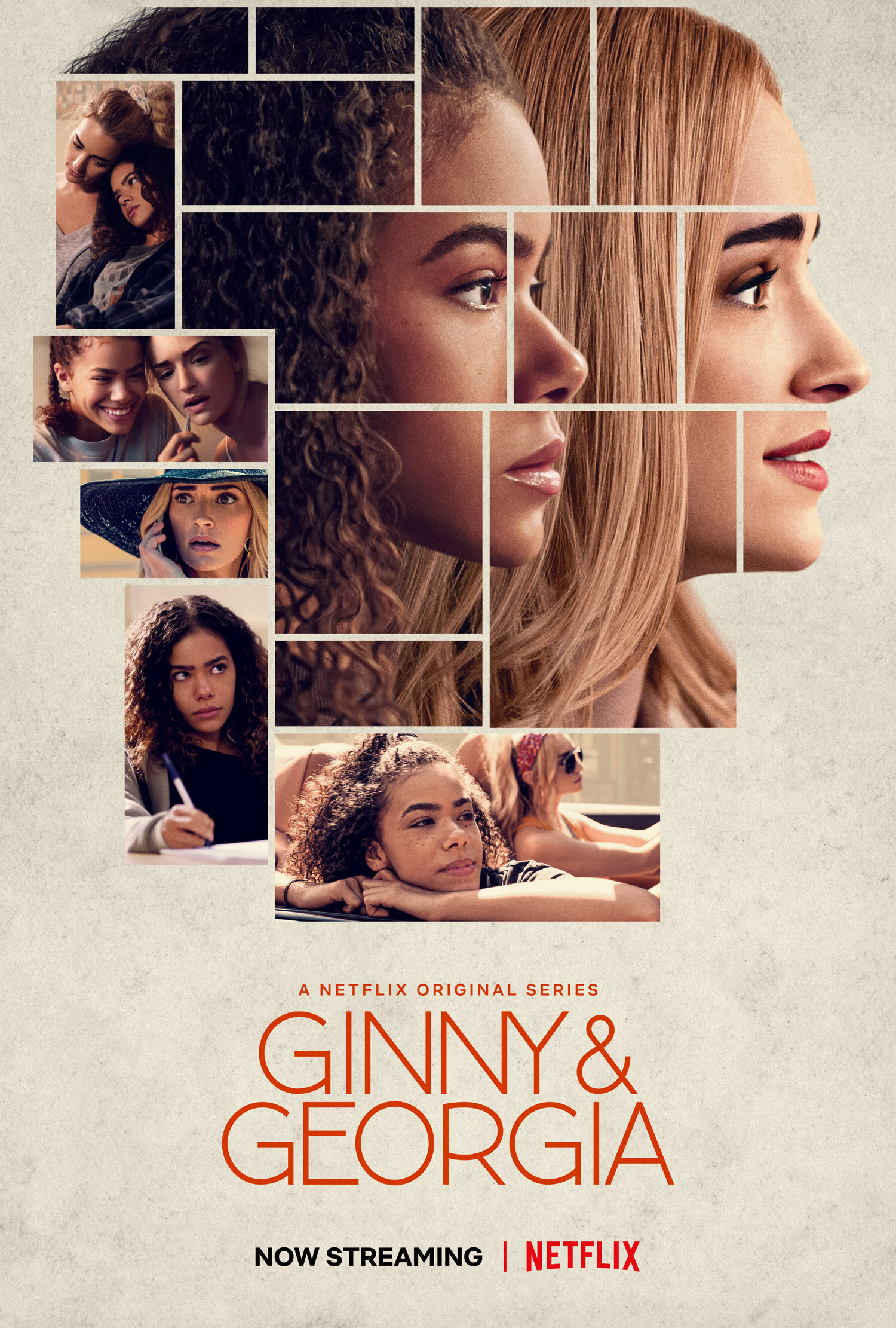Ginny and Georgia
By Charlotte Dekle
Image Source: Netflix Media Center
logline: Ginny Miller, an angsty fifteen-year-old, often feels more mature than her thirty-year-old mother, the irresistible and dynamic Georgia Miller.
Source: IMDb
I came into Ginny & Georgia expecting a Gilmore Girls-Esque mother-daughter-centric show. The anticipation was that every episode would end with a wink, a smile, and a return to normalcy. But this show asserts itself as both the anti and spiritual successor to Gilmore Girls. This assertion goes so far as for Georgia to say, "We're like the Gilmore Girls with bigger boobs." And so they are. That glossy distinction is the primary separation between Gilmore Girls and Ginny & Georgia. Peppered in for good measure is that good ol' saccharine sentimentality of the family shows of history. But this sentimentality is promptly discarded for the tried and true teen melodrama. Netflix would be nothing if it didn't give us a way to channel the teen troubles of our time. With two different love triangles, familial drama, and other issues, this show is a lot. The first few episodes seemed like the creators launched darts at a wall labeled 'teen issues' to see what would stick. Many seemingly crucial storylines dissolved within an episode. In its quiver of issues to be addressed, sexism and racism are the most ever-present aggressors. That does not mean that the aggression is meaningful or subtle. In one scene, Ginny gives a presentation about how Lydia Bennett is a feminist, and we demonize her for that. A small debate ensues, and in the chaos, the teacher calls Ginny aggressive. That taunt is a feeling that all women have known at one point or another. Racism is far more subtle than sexism is. Being coded by misguided questions or compliments, racism abounds. Ginny's English teacher looks to Ginny as a tokenized version of herself and directs many semi-racist messages towards her. The pacing of the show can either be a strength or a weakness. The show moves at a rapid-fire pace. The rapid-fire is not fundamentally a wrong thing. It could just mean that there is not a dull minute. They do have a lot of ground to cover. Many story beats concluded in the familiar maxims, "Well that escalated quickly,” and, “who/what is that?” On a separate note, there is ample to be desired from the dialogue. It's written in a way that evokes a 30-year-old reminiscing about his teenage years while trying to stay current through exclusively the headlines of Buzzfeed articles. For example, the teen avatars use the word 'lit' and ‘stan’ in numerous instances. There are also many moments that provide contrived drama but actually make no sense. This all comes down to the dialogue. I should preface this by saying that I customarily welcome pop culture references in my daily dose of t.v. But I did not enjoy this show's heavy-handed attempt at pop culture relatability. If one line mentions Boy Meets World's Shawn Hunter, and the next line mentions Romy and Michele, you know you've bitten off more than you can chew. Do not get me wrong; I enjoy a reference as much as the next pop-culture enthusiast. But this constant bombardment of relations to obscure 90s television is enough to annoy even the most dedicated culture nerd. To the creator's credit, there are some semi-accurate moments. That includes the ever-looming threat of the Macarena for Gen Z, the Cupid Shuffle. Ginny & Georgia also provides us with a remarkably fresh and candid look at teenage sexuality, specifically female sexuality. Female sexuality is so often either demonized, weaponized, or excluded by society, which is why it's so wonderful to see it presented in such an honest manner. The most significant issue with this production is that it has not fully bathed in the sudsy stream of its teen soapiness. My serendipitous discovery of this program coincided with my being enraptured by sudsy teen drama. But if you plan on watching Ginny & Georgia, allot your time wisely. You'll be spending a lot of it trying to decipher what is happening.
my favorite characters:
Sara Waisglass as Maxine “Max”: the only character without forced pop culture references. I am a huge Sara Waisglass fan and I approve that her character’s style was transported from the 1980s. I mean this is the character that’s in theatre, talks about the fine line between thespian and lesbian, and dramatically exits group chats in protest once a day. She also has this crush on the fiendishly talented Riley (played by the wonderful Devyn Nekoda). Max is a theatre kid much like myself and I can somewhat relate to the trials and tribulations that she goes through with love and musicals. She is one of the only characters who doesn’t just pine, but actively initiates a relationship. She still definitely pines but at least she tries to initiate a relationship. This initiation leaves her open to rejection and unable to climb the rope in the gym due to “emotional duress.” Max is so overdramatic but I love her for it. Her relationship with Sophie is also a definite highlight of the show.
Felix Mallard as Marcus: one of the points on the Ginny Miller love triangle. My opinions on Marcus wildly fluctuated between scenes. In one instance, I love his brooding and sensitive loner streak and in the next, he’s being a terrible person and I hate him. Marcus is Maxine’s twin brother, the bad boy/boy next door who has the personality equivalent of the ‘In case you didn’t notice, I’m weird.’ monologue from Riverdale who opines in a debonair tone “I don’t do girlfriends.” But you realize this tough facade is because his best friend died the year before. His constant pursuit of a relationship with Ginny is fraught from the beginning because he has a “girlfriend” and Ginny has a boyfriend but that doesn’t stop him from sulking in corners and staring longingly at her. That seems to be his constant state, looking dejected and pouty in a corner while staring at the protagonist. Also, the fact that the first few episodes' plotlines seem to be filler between their steamy make-out sessions. The actor is also Australian and there is a moment in Episode 3 where he does a fake Australian accent and that alone deserves props. Also, this guy’s acting DOES NOT MISS. He’s also really REALLY attractive and that helps your acting too I guess.
Mason Temple as Hunter Chen: the other point of Ginny’s love triangle. I am Team Hunter all the way. He is so good to her. HE DID A TAP DANCE FOR HER BIRTHDAY (see below). I know that she doesn’t owe him love, but I’ll love him. They understood each other and he was sweet and funny and a genuinely good guy. He makes it on the list because I want to date him and it must be known. He is the complete opposite of Marcus. He is never self-centered, he gives it all for Ginny. Of course, she doesn’t want that and that’s fine but that doesn’t mean that I can’t have him. His acting is fantastic too! I mean poor Ginny. Having to choose between two great, attractive guys. But one actually created a viral song for her and choreographed a tap number to Happy Birthday. Clearly, I have a bias. His actions in the finale were inexcusable but you understand where he was coming from. TEAM HUNTER. Sorry, Marcus.
Antonia Gentry as Ginny Miller: She gives her name to one-half of the eponymous mother-daughter duo. She’s the new girl who is dealing with all of the issues that come with being new to a school but she’s also the token African American in her friend group and deals with the repercussions of that. The aggressions she faces genuinely irk me because they seem to flout common decency. Ginny is a mixed-race teen. This sense of identity plagues her in almost every decision she makes. She is "too black for the white kids and too white for the black kids," she quipped. This idea of not being able to fit in is a relatable sensation for many children. High school is complicated, and many teens feel that they don't exactly know where they belong. Her teen emotions are relatable and her relationship with her mother is a refreshing part of this rather stale premise. Her character is almost as defined as her eyebrows and Ms. Gentry is wonderful in this girl’s complexities.
this series is rated TV-14. here’s why:
Moderate Sensuality
Occasional Language
favorite part: In Episode 7, it is Ginny’s birthday and her boyfriend (Hunter Chen played by Mason Temple) begins a TAP DANCE to a jazz version of Happy Birthday. If you weren’t convinced that he’s the best boyfriend, I bet you are now. He strolls down the hallway like he’s Gene Kelly and begins a sweet tap dance with two buddies of his. I can’t tap dance so I can’t attest to how good the dancing is but it’s the thought that counts. Everyone around him is obviously struck with jealousy that they don’t have Hunter as a boyfriend. Ginny seems rightfully cheerful. Marcus acts extremely annoyed by the kind gesture, as usual. But don’t listen to him Ginny, Hunter is perfect. Note to self: get a love interest who can tap dance.
Fun Fact: This show is filmed in Canada and they had to remove the Canadian flags from the town they filmed in and replace them with American flags. This Canadian identity makes sense considering the large pool of actors that come from the Degrassi Saga. Sara Waisglass (Max) and Chelsea Clark (Norah) are both Degrassi: Next Class alum and portray two members of the MANG clique. Devyn Nekoda (Riley) and Raymond Ablack (Joe) are two former Degrassi: The Next Generation cast members. The former plays a hyper-talented theatre kid and the latter is the lowly cafe owner who pines for Georgia from afar. We also witness the biggest travesty in history, the characters eating fries with a fork. THIS ISN’T POUTINE, YOU CAN USE YOUR HANDS. Anyway, as a fan of shows for teens (check out my 3-part lenZ piece on the subject), I loved seeing my favorite Canadians wash over into this upper-middle-class Massachusetts town.
where to watch:
IMDb:




